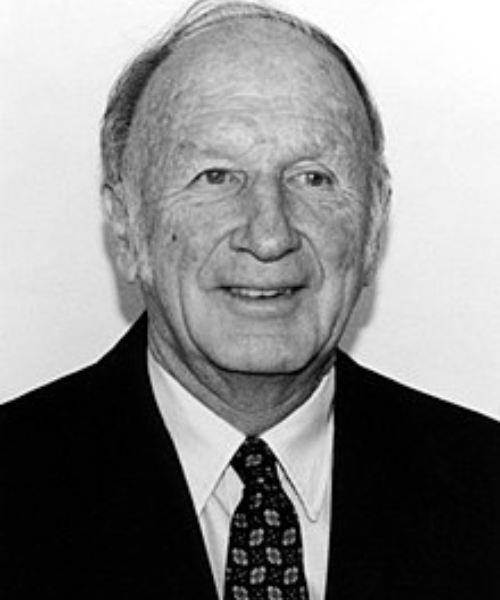The “butterfly effect” is a profound concept derived from chaos theory, first articulated by the insightful meteorologist Edward Lorenz during the 1960s. At its core, the idea posits that even the most minuscule alterations in intricate systems can result in significant unexpected outcomes.
Edward Norton Lorenz, born into the world in 1917 in the picturesque town of West Hartford, Connecticut, was not just an American mathematician, but also an advanced meteorologist. His academic journey took him into the realms of mathematics at esteemed institutions like Dartmouth College and Harvard University. When World War II cast its shadow, Lorenz took up the mantle of a weather forecaster, serving the United States Army Air Corps with dedication. The war’s conclusion transitioned him to the hallowed halls of MIT in 1955. It was here, amidst the blend of academia and innovation, that Lorenz would stumble upon and develop his groundbreaking theories on chaos.

A pivotal moment arrived in 1961. Absorbed in a computerized weather simulation, a spark of curiosity led Lorenz to rerun a sequence, but with a small alteration to the initial conditions. What unfolded was astonishing. This seemingly inconsequential change spiraled into a dramatically different weather prediction. This serendipitous observation was the genesis of the butterfly effect. Lorenz eloquently defined the essence of his discovery with a poetic metaphor, the mere flap of a butterfly’s wings in Brazil could set off a tornado in Texas. This imagery vividly conveyed the nature of nonlinear systems, where the tiniest of initial variations can be magnified exponentially, leading to drastically different results.
The implications of Lorenz’s revelation were nothing short of revolutionary. The prevailing consensus among meteorologists had long been that atmospheric behaviors were linear and predictable. Lorenz’s meticulous research and observations upended this belief, showcasing the unpredictability embedded within long-term weather predictions, especially when compounded by the amount of minuscule changes that constantly occur.
But the ripples of the butterfly effect extended far beyond the confines of meteorology. The scientific community, spanning diverse disciplines from biology to economics, began to reveal patterns and behaviors within their respective fields. Lorenz’s concept illuminated the profound interconnectedness of various systems and the cascading consequences that can emanate from the smallest of initial disturbances.
Lorenz’s endeavors in chaos theory not only challenged, but also deconstructed long-standing deterministic views. His work paved the way for the contemporary analysis of complex systems. While the butterfly effect has gained widespread acceptance and admiration, it hasn’t been without its skeptics. Some contend that in the vast expanse of intricate systems, exceedingly minute changes often dissipate or counteracted by another small change, therefore canceling both events.
Yet, debates aside, the legacy of Lorenz’s work is undeniable. It serves as a compelling evidence to the monumental impacts that can arise from events or changes that may seem trivial. His vision has reshaped our comprehension of the intricacies of complex systems across a myriad of scientific disciplines. The butterfly effect stands as a profound allegory, reminding us of the delicate nature and events that sculpt our environment.
In the vast expanse of scientific exploration, it’s often the grand theories and monumental discoveries that capture our collective imagination. Yet, the tale of Edward Lorenz and the butterfly effect serves as an important reminder that sometimes, profound thoughts emerge from subtle observations. Lorenz’s journey wasn’t marked by colossal equipment or grand expeditions, but by a keen eye, an open mind, and a relentless curiosity about our planet and its complexities.
While originated in the field of meteorology, the butterfly effect has profound implications that ripple through many different aspects of life. Its principles have been embraced by decision-makers, ethicists, and individuals, reshaping how we perceive our roles within society.
In the realm of public policy and governance, the butterfly effect highlights the importance of foresight and comprehensive impact assessment. Decisions, even those seemingly minor, can have cascading effects on communities, economies, and environments. For instance, a small change in tax policy might influence business decisions, which in turn could affect employment rates, consumer behavior, and even societal well-being. Recognizing this interconnectedness, policymakers are increasingly employing systems thinking, an approach that considers the wider and longer-term impacts of decisions.
Ethically, the butterfly effect challenges us to consider the broader consequences of our actions. In a world where our choices can have far-reaching impacts, ethical frameworks have evolved to emphasize not just immediate outcomes, but the potential long-term and indirect effects. This is evident in debates surrounding technologies such as genetic engineering or artificial intelligence, where a single decision can set off a chain of events with global implications.
On a personal level, the butterfly effect has become a powerful narrative in self-help and personal development circles. It serves as a reminder that every action, no matter how small, can set off a ripple of consequences. This perspective encourages mindfulness and our intentions in our daily choices, from relationships, to health, to the products we consume. On the positive side of the coin, the idea that a simple act of kindness or a small personal change can have a transformative effect on someone’s life or even a community is deeply empowering.
Furthermore, in the arts and literature, the butterfly effect has inspired countless narratives exploring alternate realities, the consequences of choices, and the intricate web of fate and free will. These stories, whether in film, literature, or music, resonate deeply with audiences, reflecting our collective fascination with the idea that every choice matters and shapes the trajectory of our lives and the world around us.

Today’s scientists stand on the precipice of uncharted territories, with tools and technologies that Lorenz could only dream of. However, within this whirlwind of progress, there’s an invaluable lesson to be gained from Lorenz’s legacy. It’s not always about seeking the loudest signal or the brightest star. Sometimes, the most transformative revelations lie hidden in the gentle flutter of a butterfly or a barely detectable gravitational wave traveling through space-time.
As we push the boundaries of knowledge and understanding, let us not forget the art of quiet or subtle observation. Let’s share a mindset that values the nuances, that cherishes the seemingly insignificant, and that recognizes the potential for vast discoveries hidden in places we’d least expect. For in those overlooked moments, embrace the spirit of Lorenz. Let your scientific journey be guided not just by the quest for the spectacle, but also by a reverence for the delicate events in and around our planet. Rest assured, whether in a dense forest, deep in our oceans, or venturing into the cosmos, there are patterns and influences yet to be discovered. May you listen for the whispers and observe the subtle flutter to find your own butterfly effect that just may hold the key to the next groundbreaking chapter in science.






